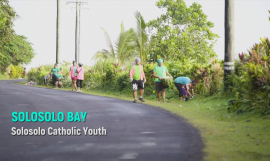The role of traditional and cultural practices and religion in influencing positive environmental behaviours amongst Pacific Island communities was discussed during the sixth day of the Third Clean Pacific Roundtable (3CPRT).
Alannah Smith of the Cook Islands’ Te Ipukarea Society, shared how the people of Rarotonga have returned to subsistence living as a result of the COVID-19 pandemic. This has resulted in the subsequent decrease of plastic and other imported waste entering the waste stream and landfill.
“Financial hardships had come into play due to COVID-19 so a lot of our people had to go back to what they knew by living on the land and fishing locally,” said Ms Smith.
“Rarotonga has gotten used to a consumerism lifestyle, with tourism being our number one industry, and we had gotten used to being spoilt with a variety of imported goods. COVID however created a sudden change where we could no longer live the way we used to on a day-to-day basis,” she added.
Communities went back to growing their own vegetables and herbs, as well as composting, and re-appreciating the concept of going local and traditional values of sharing produce amongst families and the wider community. From the waste perspective, this resulted in less imported products going back into the waste stream in our landfill, particularly plastic packaging waste. Subsistent living was becoming of value again.
Smith shared her personal experience of travelling onboard the Cook Islands’ traditional voyaging vaka Marumaru Atua, which is the country’s national symbol for sustainable transportation and also the vaka that ties their people back to their ancestors.
“The opportunity to sail and live onboard the vaka for three months forced myself out of my materialistic habits to a more minimalist way of living. Our crew reused a lot of products and we were constantly mindful of our waste and preserving water and food we had onboard,” she said.
“This experience allowed me to see that I really don’t need a lot of the things I currently owned and that I had become a part of the consumerism lifestyle which has become our common way of living in Rarotonga.”
Smith reiterated that traditional cultures can positively influence sustainable behaviours by allowing people to reconnect with nature and their environment forming these guardianship values of respect and the desire to want to care for their surrounding environment.
Rev James Bhagwan, General Secretary of the Pacific Conference of Churches, shared on the role of religion and spirituality in raising awareness around environmental behaviours and mobilising the community to get behind the waste cause.
“Any work to address the environmental protection and waste management in our region must be holistic in its approach – combining the head, the heart, and the hands,” said Rev. James.
“The faith communities which are embedded in all Pacific communities have been neglected in partnerships for addressing something that is supposed to be a basic cultural and faith practice. From the indigenous perspective, it is about caring for the vanua, the fenua, the onua. From the faith perspective, it is about caring for creation.”
According to Rev James, there have been positive impacts of partnerships between environmental organisations and faith communities, which has been seen in a number of clean-up campaigns that take place and utilise churches to mobilise the communities.
He states that this can and needs to be built upon.
“Churches are the most common institutions and agents of social transformation in most Pacific communities. Spiritual and theological resources and church programmes can shift community and social consciousness around stewardship of the environment, including practical programmes that can be sustained by communities long after projects end.”
He stated that faith communities can play an important part in sustaining these works by filling in the gaps. If it’s not taught in schools, it can be taught in Sunday schools. If it’s not part of formal community programmes, it can be part of Church community programmes.
According to Rev James, the Pacific Conference of Churches made up of 33 member churches and ten national council of churches over 19 Pacific Island countries and territories is open to engaging in collaboration with partner organisations in taking this important task and much needed shift into the community.
SOURCE:SPREP/ PACNEWS


















